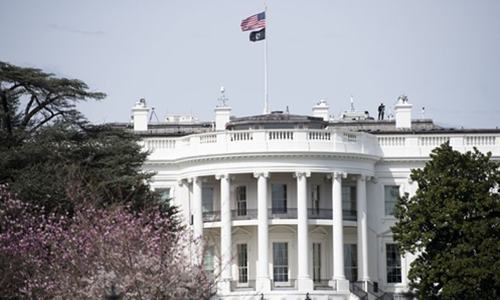HOME >> SOURCE
Failing businesses need bailout, plain-clothes folks need safety net
Source:Global Times Published: 2020/3/29 20:43:41

The White House Photo: Xinhua
US President Donald Trump on Friday signed a colossal $2 trillion economic rescue bill aimed at blunting the economic shocks from the coronavirus pandemic.There are many generous bailout plans in the Coronavirus Aid, Relief and Economic Security (CARES) Act. Specifically, the US government will expand the emergency safety net for the unemployed by offering an additional jobless benefit of $600 a week for four months and handing out cash to lower- and middle-income Americans.
While it is uncertain whether the stimulus package will be enough to help the US economy cushion the massive coronavirus hit, the unprecedented rescue plan sent a signal that the US government is willing to back up its people's livelihood - the foundation of its social stability - at all costs in the face of a huge health crisis.
According to data from the US Labor Department, a record 3.28 million people applied for unemployment benefits in the week ending on March 21, a massive surge compared with the previous week. And the figure will likely increase as the pandemic, which has forced businesses across the country to close and slash jobs, hasn't shown signs of stabilization yet..
In fact, the US is not the only country which has meted out a massive economic stimulus plan. The UK, France, Germany and many other countries have promised to open the floodgate to avert business bankruptcies. For instance, the UK government has agreed to pay 80 percent of a worker's salary up to a cap of 2,500 pounds ($3,113) a month to those who are unable to work because of the pandemic, and the subsidy plan will cover a period of at least three months.
This is because governments have all seen a growing urgency to offer a strong safety net for its lower- and middle-classes as well as small businesses to tide over the difficult times, otherwise short-term shocks triggered by the virus may turn into a long-term impact, which in turn will result in social unrest. The International Labour Organization recently warned that the pandemic could cause as many as 25 million people to lose jobs.
Against such a backdrop, there is a need for China to consider how to ensure its people's livelihood in a worst-case scenario. While the outbreak has been largely brought under control, the economic challenges and uncertainties facing China have grown substantially amid the escalating pandemic abroad.
Restarting the economy may require a certain "big push," which, however, must go beyond simply investing in infrastructure construction. So when it comes to economic rescue and recovery plans, the Chinese government still needs to be prepared with a bottom-line mindset and prioritize employment and basic well-being for its people.
Posted in: GT VOICE